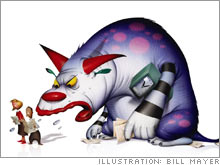|
Why the minimum wage doesn't matter The once-reliable bugbear has lost much of its political bite. And there are better ways to help the working poor.
WASHINGTON, D.C. (FSB Magazine) -- If you were looking for an opponent of minimum-wage increases, you might turn to someone such as Mazyar Rahimzadeh, 25. He's got a half-million dollars in debt hanging over him, employs 35 workers, and just opened his second restaurant, Bijan, in Walnut Creek, Calif. Yet when he's asked about the California legislature's proposed bill to raise the state's minimum wage by 50 cents an hour, he just shrugs. "It wouldn't make that much of a difference," he says, pointing out that he already pays his workers more than the state's current minimum of $6.75 an hour.
This election season, the minimum wage has once again become a political rallying point. The Chicago City Council's recent decision to require big-box retailers to pay all employees at least $10 an hour, plus $3 an hour in benefits, is just the beginning. Democrats in Congress are renewing their efforts to raise the federal minimum wage - stuck at $5.15 since 1997 - as a way to paint themselves as the party of the little guy. Most Republicans, while wary of polls that show public support for a higher wage, oppose it on free-market grounds, especially when addressing small-business audiences. (The Republican-controlled House approved a minimum-wage hike only after it was attached to a cut in the estate tax in late July, a move that doomed the bill in the Senate.) But as Rahimzadeh's shrugging response indicates, the issue may no longer hold the power it once did to provoke heated passions among most business owners or even many low-income workers. "I don't see the minimum wage as something that can drive a Democratic message or become a political flash point," says Amy Walter, an analyst for the Cook Political Report, who closely follows congressional races. To be sure, the half-million Americans who earn the minimum would welcome a raise. And the major small-business lobbying groups have rallied against further increases. Employers of entry-level workers in businesses such as restaurants, landscaping firms, and retail shops, especially outside the major cities, are the most adamant opponents. But since that last minimum-wage hike in 1997, inflation has pushed up most wages to the point that only 0.3% of full-time workers are paid the minimum. (One percent make less than that, either illegally or because they receive tips.) In a poll of small-business owners released in March by Wells Fargo and the Gallup Organization, 86% of those surveyed said the minimum wage had no effect on them or their hiring practices. And even if the wage went up by 10%, some 75% said there would be no effect on their business. Only 14% of small-business owners who said they were thinking about hiring a new employee told the pollsters they would hire at the minimum wage. Dennis Jacobe, Gallup's chief economist, who conducted the survey, says that its results could be partially explained by the growing number of states and localities that have set their minimum wages higher than the federal level. Even more important, Jacobe says, the typical small business hires fewer unskilled workers and more specialists than in years past. And in a tight labor market, businesses are finding that they need to pay higher wages, even to entry-level employees, to find good workers and retain them. Between 1997 and 2004, the most recent year for which the U.S. Bureau of Labor Statistics has figures, the average hourly wage rose 8.3%. The minimum wage has become irrelevant to a growing majority of business owners and workers. But if a minimum-wage hike won't raise many hackles, that doesn't mean that it will be without victims - specifically, those businesses that do pay the minimum to many of their workers and operate in competitive industries. "We cannot raise prices," says Jack Wolcott, the owner of a bookstore in Corvallis, Ore. "So we have to consider discontinuing slower-moving items to compensate [for higher wages]." It gets more difficult to justify the burden on small employers of a mandated wage hike when you consider that the Bureau of Labor Statistics estimates that fewer than 30% of minimum wage earners are considered "heads of household," according to Richard Burkhauser, professor of policy analysis and management at Cornell University. The other 70%? Mostly relatively well-off part-timers, such as suburban teenagers working summer jobs. Boosting the minimum wage, then, would benefit many workers who aren't poor, and punish many businesses owners who can't afford it. There are more targeted ways to help the working poor. Burkhauser proposes an increase in the earned income tax credit, which would essentially rebate some of the 15.3% federal payroll tax that is paid even by workers too poor to owe income taxes. Stuart Butler, vice president for domestic and economic policy at the conservative Heritage Foundation, suggests giving further tax incentives to the working poor, including offering refundable health-care tax credits and repealing the federal unemployment tax. Why haven't these options gotten as much attention from lawmakers as has the minimum wage? Just a guess, but maybe it's because they don't offer as many juicy election-year opportunities to pit workers and employers against each other. ---------------------------- Wal-Mart to hike starting pay at some stores Minimum wage bill stalls in Senate |
|

